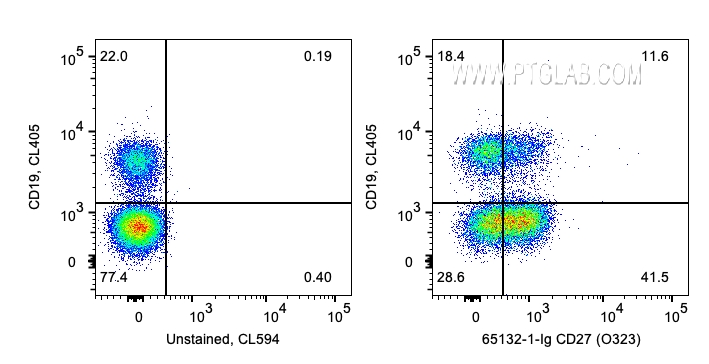验证数据展示
经过测试的应用
| Positive FC detected in | human PBMCs |
推荐稀释比
| 应用 | 推荐稀释比 |
|---|---|
| This reagent has been tested for flow cytometric analysis. It is recommended that this reagent should be titrated in each testing system to obtain optimal results. | |
| Sample-dependent, Check data in validation data gallery. | |
产品信息
65132-1-Ig targets CD27 in FC applications and shows reactivity with Human samples.
| 经测试应用 | FC Application Description |
| 经测试反应性 | Human |
| 免疫原 | N/A 种属同源性预测 |
| 宿主/亚型 | Mouse / IgG1, kappa |
| 抗体类别 | Monoclonal |
| 产品类型 | Antibody |
| 全称 | CD27 molecule |
| 别名 | CD27, CD27 antigen, CD27 molecule, CD27L receptor, S152, T cell activation antigen CD27, T14, TNFRSF7, Tp55 |
| 计算分子量 | 29 kDa |
| GenBank蛋白编号 | BC012160 |
| 基因名称 | CD27 |
| Gene ID (NCBI) | 939 |
| ENSEMBL Gene ID | ENSG00000139193 |
| RRID | AB_2918420 |
| 偶联类型 | Unconjugated |
| 形式 | Liquid |
| 纯化方式 | Affinity purification |
| UNIPROT ID | P26842 |
| 储存缓冲液 | PBS with 0.09% sodium azide , pH 7.3 |
| 储存条件 | Store at 2-8°C. Stable for one year after shipment. |
背景介绍
CD27 (also known as TNFRSF7) is a type I glycoprotein expressed on some B cells and the majority of T cells, and is a member of the tumor necrosis factor (TNF) receptor family. CD27 is required for generation and long-term maintenance of T cell immunity (PMID: 11062504). It is a receptor for CD70 (CD27L). Ligation of CD27 by CD70 induces strong ubiquitination of TRAF and the activation of both canonical and non-canonical NF-kappaB pathways, as well as the JNK pathway (PMID: 19426224). CD27 may also play a role in apoptosis through association with SIVA1.
实验方案
| Product Specific Protocols | |
|---|---|
| FC protocol for CD27 antibody 65132-1-Ig | Download protocol |
| Standard Protocols | |
|---|---|
| Click here to view our Standard Protocols |
